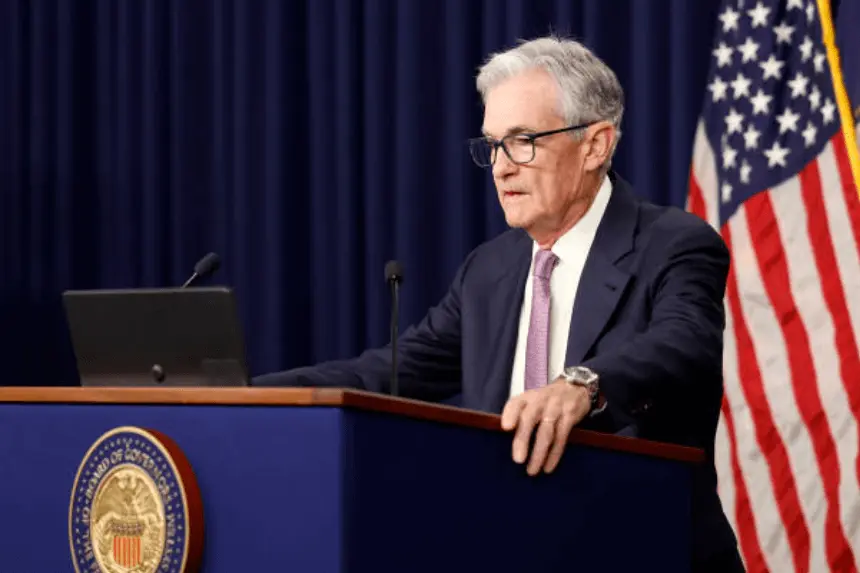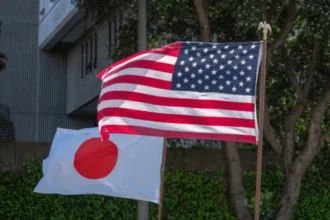Donald Trump attacks the Federal Reserve again by calling for Jerome Powell to step down. This starts a lot of talk about the independence of the central bank.
- What does Trump want from Jerome Powell Federal Reserve, again?
- Can the President Fire the Head of the Federal Reserve?
- Did Trump’s tariffs affect interest rates?
- Are More People Asking for an Investigation?
- What do these things mean for the Fed’s future?
- What does this mean for you and the economy?
- Conclusion: What’s Next?
Former President Donald Trump wrote a strongly worded post on Truth Social demanding that Federal Reserve Chair Jerome Powell step down right away. The post had a direct message that said, “‘Too Late’ should resign right away!!!” and a link to a news story about Powell’s supposed lying during Senate testimony.
This most recent fight has brought up the Jerome Powell Federal Reserve’s role, independence, and public accountability in the news again. Trump, who chose Powell to be the chair in 2017, has had a lot of fights with him over decisions about monetary policy, especially about interest rates and how fast the economy is growing.
What does Trump want from Jerome Powell Federal Reserve, again?
There are two main issues that Trump’s recent criticism is based on. First, he says that Powell is to blame for not lowering interest rates while he was in charge. Trump said that lower rates would have helped the economy grow and made America more competitive.
Second, he’s taking advantage of recent news stories about the expensive renovations at the Federal Reserve’s headquarters in Washington, D.C. The article says that luxury features and rising budgets were involved, which made politicians question Powell’s honesty.
Trump used the report to call into question Powell’s honesty and ability to do his job. Trump turned the issue from a disagreement over policy into a public accountability challenge by linking it to his demand for resignation.
Can the President Fire the Head of the Federal Reserve?
No, not without a good reason. The Federal Reserve is an independent federal agency. A famous Supreme Court decision from 1935 says that its leaders can only be fired “for cause.” This means that there has to be proof of wrongdoing, neglect of duty, or criminal activity.
Earlier this year, Jerome Powell himself talked about this problem. He said again that he would not resign and stressed that the White House does not have the legal right to fire him. This strengthens the rules that keep the Jerome Powell Federal Reserve from being directly affected by politics.
This independence means that the central bank can make choices based on long-term economic data instead of short-term political gain. But it also means that public figures who want to question the Fed’s leadership must do so through legal means, such as congressional hearings. Read another article on Vietnam’s Economic Transformation
Did Trump’s tariffs affect interest rates?
Powell said in a recent speech at a global economic forum in Portugal that the Federal Reserve might have cut interest rates more aggressively if Trump’s trade policies hadn’t made things so uncertain.
Powell said, “I think that’s right,” when asked if rates would have gone down again this year if the government hadn’t announced a big rise in tariffs.
This comment shows how closely fiscal policy and monetary policy are related. Tariffs can cause problems in the economy, like inflation, instability in the global market, and less investment by businesses.
The Jerome Powell Federal Reserve wants to stay out of politics, but it still has to deal with the economic effects of political actions. In this case, Powell said that Trump’s tariffs made things less certain, which made the Fed more careful.
Are More People Asking for an Investigation?
Yes, and not just Trump. Bill Pulte, who is in charge of the Federal Housing Finance Agency (FHFA), has also asked for an investigation into Powell. Pulte wrote on social media not long ago, “I am asking Congress to look into Chairman Jerome Powell, his political bias, and his misleading Senate testimony.”
Pulte, who has been very critical of Powell, says that the Senate was given false information about the size and cost of the Federal Reserve’s renovations. He says that this is enough to start a legal review under the “for cause” provision.
Powell stood by his testimony in response. He said that a lot of the reports about the renovations were “misleading and wrong in many, many ways.” The Federal Reserve has not said anything else about Trump’s comments or Pulte’s call for an investigation.
What do these things mean for the Fed’s future?
The pressure is rising, even though Powell is still in his job, and there is no formal process to remove him. There is more public debate about Powell’s leadership now, whether or not this leads to a legal investigation.
Powell’s job isn’t the only thing at stake. The Jerome Powell Federal Reserve’s ability to work without political interference is also being put to the test. Politicians, investors, and economists are keeping a close eye on how these problems develop.
We can expect more attention shortly. There may be calls for congressional hearings or independent reviews. The way the media covers things will continue to shape how people think. And Trump is likely to keep the issue alive, especially as the election season heats up.
What does this mean for you and the economy?
The Federal Reserve is very important to your daily finances. Its rules affect the interest rates on savings accounts, credit cards, and mortgages. People and businesses can borrow and spend more or less when the Fed raises or lowers interest rates.
Politically motivated pressure on the Jerome Powell Federal Reserve could make it less independent, which could lead to unstable or short-sighted monetary decisions. That could make inflation more likely or even cause the economy to go down.
Because of this, many financial experts say that the Fed should not be influenced by politics, even when there are loud and persistent disagreements.
Conclusion: What’s Next?
Trump’s new call for Jerome Powell to step down has sparked a bigger conversation about how central banks are run, how independent they are, and how open they are. The former president’s call may get political allies excited, but any real change must follow the law and the Constitution.
As the pressure rises, the result could change how future presidents work with the Federal Reserve. The main point of the debate is how much power politicians should have over an organisation that is supposed to be independent.
Powell is still in charge of the Jerome Powell Federal Reserve for now. But one thing is clear: his role will be in the news for months to come.








